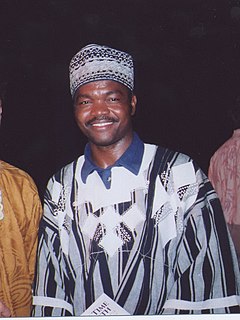Top 68 Anthropologists Quotes & Sayings - Page 2
Explore popular Anthropologists quotes.
Last updated on April 19, 2025.
The gods have fled, I know. My sense is the gods have always been essentially absent. I do not believe human beings have played games or sports from the beginning merely to summon or to please or to appease the gods. If anthropologists and historians believe that, it is because they believe whatever they have been able to recover about what humankind told the gods humankind was doing. I believe we have played games, and watched games, to imitate the gods, to become godlike in our worship of eachother and, through those moments of transmutation, to know for an instant what the gods know.
Historically the customs and traditions of day-to-day life in Africa have been dismissed by Western cultural anthropologists as primitive, chaotic, pagan activities that should be replaced by Christianity, the only civilized religion. The West has also long assumed that it should convert tribal cultures to literacy, which is to say an entirely different way of looking at the world, of living in the world. Most Africans who have achieved a comfortable Western lifestyle are Christian. Why? Because it comes with the package: Christian-ity, literacy, and a material lifestyle all come together.
Mental patterns do not originate out of inorganic nature. They originate out of society, which originates out of inorganic nature. And, as anthropologists know so well, what a mind thinks is as dominated by biological patterns as social patterns are dominated by biological patterns and as biological patterns are dominated by inorganic patterns. There is no direct scientific connection between mind and matter. As the atomic scientist, Niels Bohr, said, "We are suspended in language." Our intellectual description of nature is always culturally derived.
Certain anthropologists hold that man, having discovered tools, ceased to evolve biologically. Animals, never having discovered them, continue to fashion drills out of their beaks, oars out of their hind feet, wings out of their forefeet, suits of armor out of their hides, levers out of their horns, saws out of their teeth. Whether this be true or not, all authorities agree that man is the tool-using animal. It sets him off from the rest of the animal kingdom as drastically as does speech.
When I have a writing workshop, I like to have people that are anthropologists and people who are poking around in other fields, I like to have them all in the same workshop, and not worry about genre. I like to mix it up, because the kind of comments you can get from a fiction writer about your poetry are going to be very different than what you'll get from a poet. Or the comments you'll get from a filmmaker about your performance are going to be very different. My writing workshop is about mixing it up, cross-pollinating, not only in genres but in occupations.
John Colman Wood's The Names of Things is a thoughtful, patient, and ultimately rewarding book. It's about, among many other things, the connections human beings make, that in spite of everything, we will always make. To quote from the book, 'What he saw in the people was what the old anthropologists called communitas. It wasn't that the people sang and moved. It was their singing and moving together' Singing and moving together, Wood has found a way to express this profound and beautiful idea through fiction.
The real controversy comes with anthropologists - not all, but some - who see themselves as studying culture, and they then see culture from the perspective of humans, which is what they study. From their perspective, or, from some of their perspectives, it's sort of heresy to even talk about culture in any other animal. Others would say, "Yeah, you can talk about it, but our definitions of culture are so utterly different from yours and include things like values, and so on, which you've never shown to exist in any of these other creatures."
For the only way one can speak of nothing is to speak of it as though it were something, just as the only way one can speak of God is to speak of him as though he were a man, which to be sure he was, in a sense, for a time, and as the only way one can speak of man, even our anthropologists have realized that, is to speak of him as though he were a termite.







